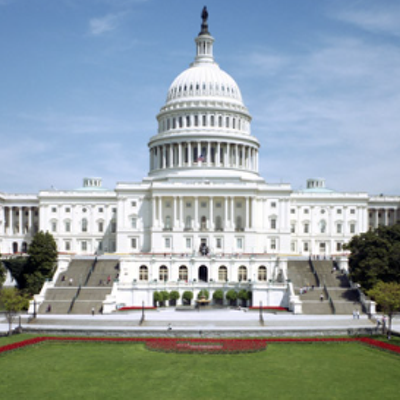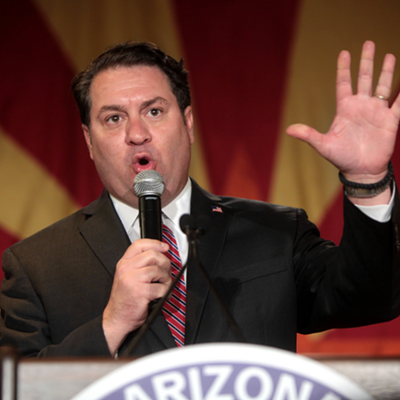See You in Court
Planned Parenthood, Pima County and Sec of State Michele Reagan highlight a particularly litigious week in politics
Arizona's lawyers were busy, busy, busy over the last week. Here's a roundup of the action on the legal front:
• Arizona Secretary of State Michele Reagan filed a request to jump into the ongoing legal action between the Arizona Clean Elections Commission and the Legacy Foundation Action Fund, a nonprofit organization that ran ads critical of former Mesa Mayor Scott Smith as Smith prepared to run for governor last year. The Legacy Action Fund said it was merely educating voters about some of Smith's activities while mayor and not at all attempting to influence the outcome of the gubernatorial primary, so it was not required to register as a political committee. The Clean Elections Commission is looking into whether the "dark money" spent by the group should be considered "issue advocacy"—which is not subject to disclosure—or an attempt to influence the outcome of the gubernatorial primary, in which case it would be considered spending by a political committee and therefore subject to campaign-finance laws that require disclosure of contributors and expenditures.
Reagan has been arguing that no one but her office should be examining campaign spending by independent groups. (See "Tales From the Dark Side," May 28.)
Reagan's lawyers note in their filing: "The primary issue in this appeal is the Commission's usurpation of the Secretary of State's statutory authority over independent expenditure reporting. Arizona law contains a detailed statutory scheme for regulating independent expenditures and the Secretary has sole authority for enforcing those provisions, in coordination with various levels of law enforcement."
Clean Elections Executive Director Tom Collins said it was "troubling that, after Citizens United and the most expensive, least transparent election in state history, the secretary of state would attempt to weigh in favor of an out-of-state influence group against the enforcement of a voter approved law by a bi-partisan agency. It is a naked effort to usurp the commission's authority. Neither the secretary nor her election director have once attended a commission meeting on any dark money issue, nor done anything but make threats through the press, use their resources to promote online push polls that backfired and create uncertainty for voters and influence groups alike. It's legally wrong and part of a pattern of anti-disclosure efforts that voters reject, regardless of party."
• Planned Parenthood filed suit against the state to block a new state law that requires doctors to tell their patients that a medication abortion can be reversed if a woman takes a different medication. While pro-life advocates have been pushing the theory, it is unproven medical science.
"If this law goes into effect, physicians will be forced to provide patients with information that is not based in science and could put a woman's health and safety at risk," said Jodi Liggett, Public Policy Director, Planned Parenthood Arizona. "This is not informed consent, it is the state-mandated promotion of junk science."
• Pima County filed suit against the state over one of the budget-balancing maneuvers employed by Gov. Doug Ducey and the Arizona Legislature.
Pima County Administrator Chuck Huckelberry told the Weekly that over the last decade, the state has been steadily shifting costs onto Pima County. In the current fiscal year, Huckelberry estimates that Pima County is picking up $81 million in costs that the state has pushed onto the county.
The state budget passed by GOP lawmakers pushed another as much as $21 million in costs onto the counties, so Huckelberry started looking into ways for Pima County to push back against the new fiscal burdens.
"We don't want to raise taxes any more than any other jurisdiction does," Huckelberry said.
Pima County's attorneys are arguing that one of the shifts this year—which could cost Pima County between $8.4 million and $18.6 million—is unconstitutional. It's a complicated financial arrangement, but here are the basics: Way back in 1980, Arizona voters reformed the property-tax system to assure that homeowners didn't pay more than 1 percent of their home's value in property taxes. That's called the 1 percent cap.
Over the last three-decades-plus, the state has picked up the cost when local taxing jurisdictions have exceed that 1 percent cap. But under the new budget, that aid is capped at $1 million per year per county, with the local taxing jurisdictions obligated to pick up the rest and deliver it to the school districts.
Exactly how that will work remains to be seen, since the legislation created a special committee to spread out the costs across local jurisdictions. That's one of the legal targets in Pima County's lawsuit: An unelected panel is going to decide property tax bills for various jurisdictions.
The other legal argument revolves around expecting taxpayers in one part of the county—say, Ajo—to pay money that would go to the Tucson Unified School District when they have no say in how those districts are run.
The county picked its two best legal arguments while pursuing a special action at the Arizona Supreme Court. If the county gets rebuffed there, Huckelberry said he would push to file a lawsuit incorporating more legal avenues at the Superior Court level.
Ducey spokesman Daniel Scarpinato said the governor's office was reviewing the lawsuit.
"The enacted budget protects Arizona taxpayers from irresponsible taxation and responsibility balances a $1 billion budget shortfall," Scarpinato added.
The Vision Thing
State Rep Wheeler drops out of CD2 race following eye injury
We wish state Rep. Bruce Wheeler a continued recovery from recent surgery he had to repair a torn retina. Wheeler told us earlier this week that he was well enough to take a quick trip across the border to Rocky Point, so the prognosis is good.
The incident, however, has forced Wheeler to reconsider his 2016 bid for the congressional seat now held by Republican Martha McSally. He said he's likely out of the hunt, although he will stay in the House of Representatives to finish his term next year.
Wheeler was the only candidate to have filed FEC paperwork indicating that he was exploring a campaign in CD2. Former state lawmaker Matt Heinz has told The Skinny that he's interested; we've also heard insiders drop the names of current state lawmakers Victoria Steele and Randy Friese, as well as pecan-farm owner and former DC insider Nan Walden.
Potential candidates still don't know whether they'll be running in the current CD2 or in a district drawn by state lawmakers. The U.S. Supreme Court is expected to rule in a lawsuit challenging the current system by the end of the month.
Zona Politics with Jim Nintzel airs Sunday mornings at 9:30 a.m. on KGUN-9. This week's guests are Tucson Hispanic Chamber of Commerce President and CEO Lea Marquez Peterson and attorney Jeff Rogers.








